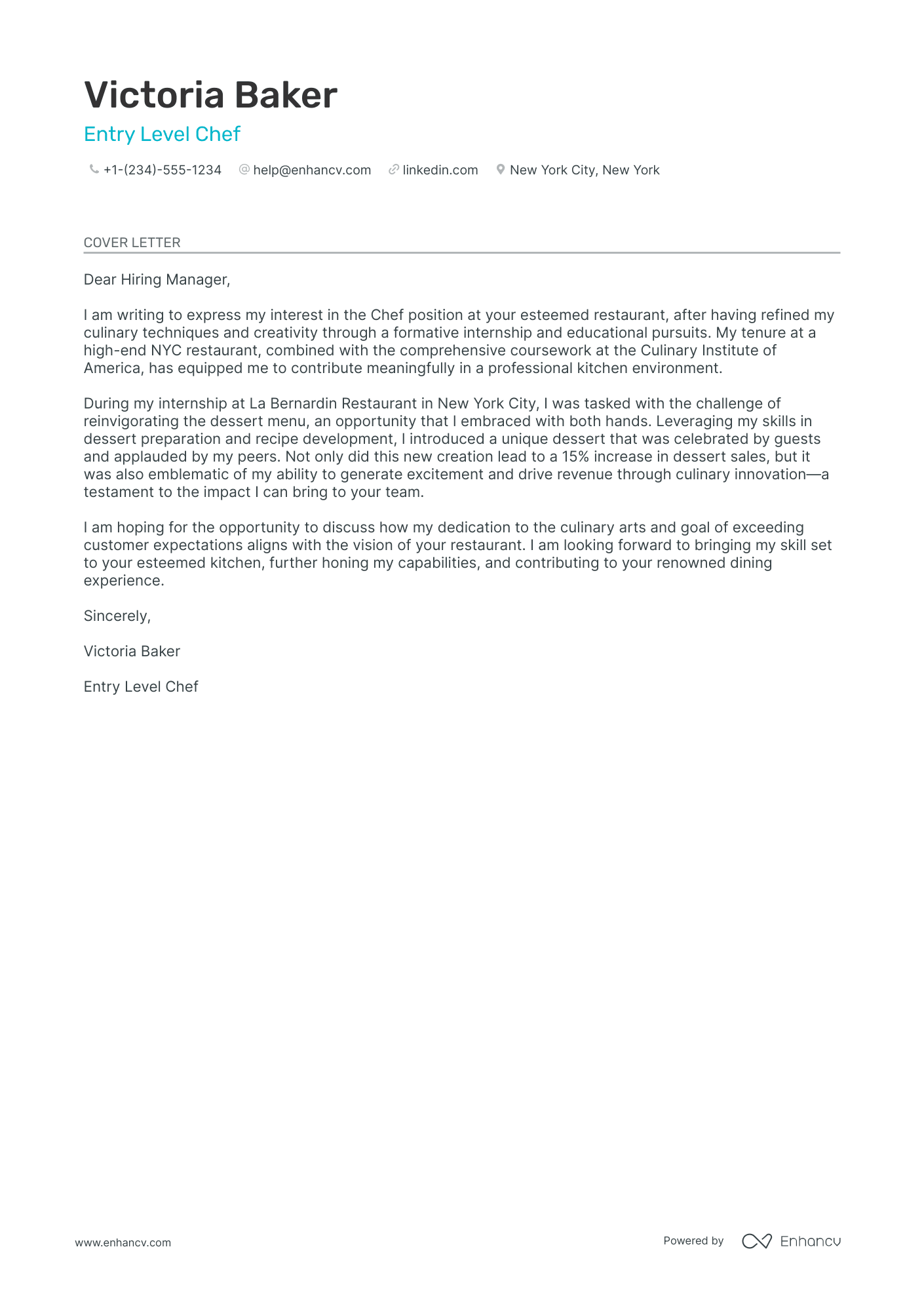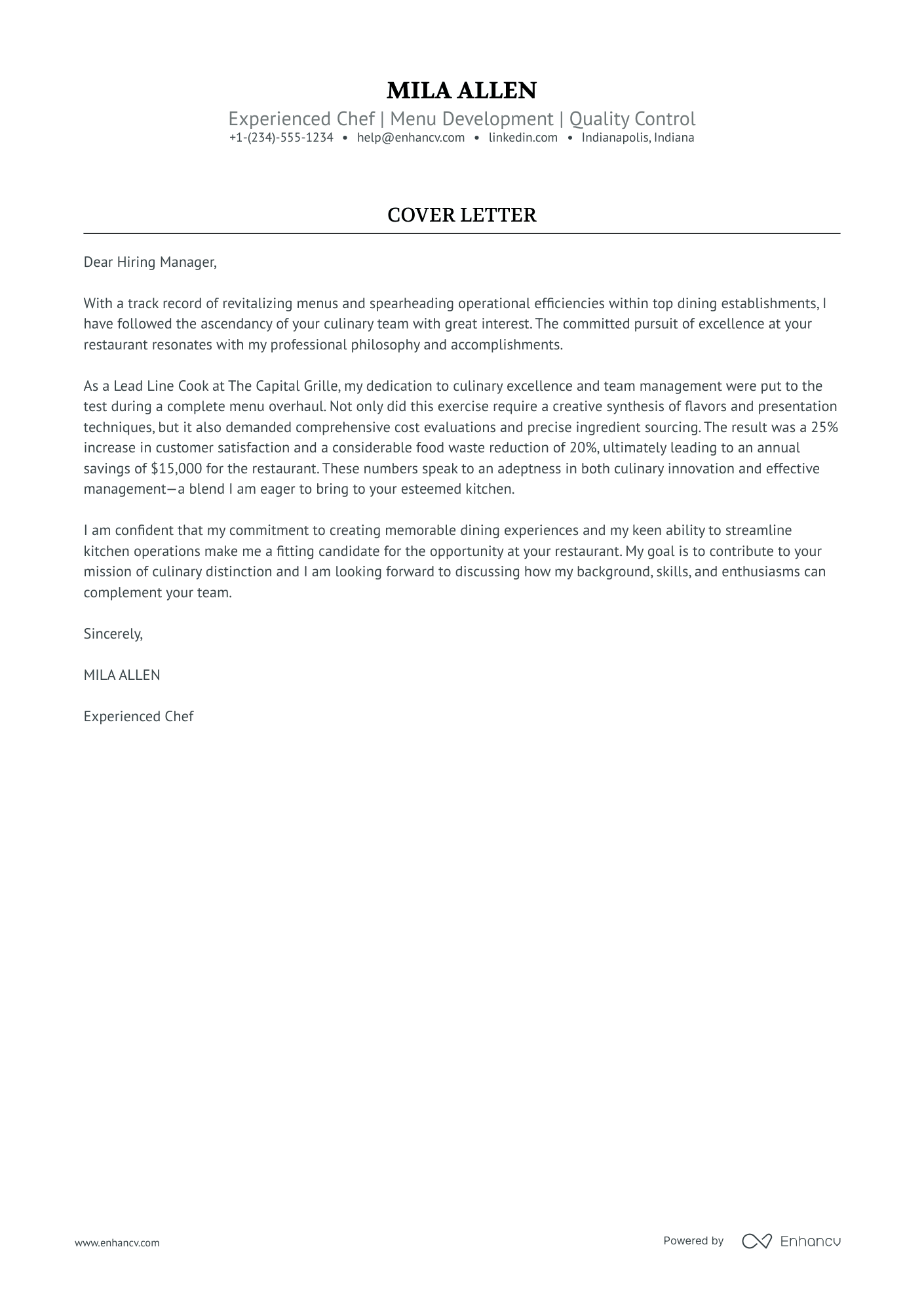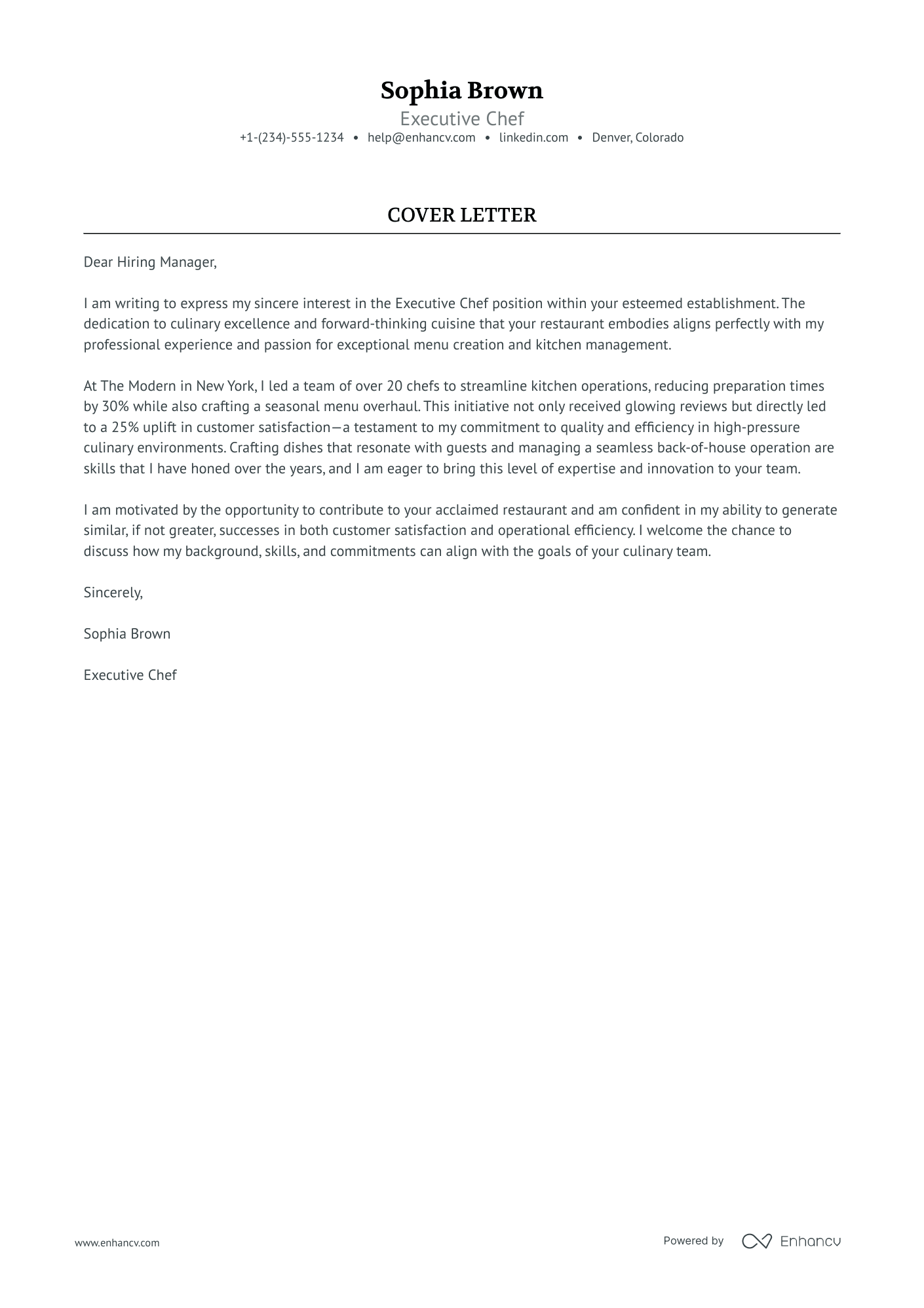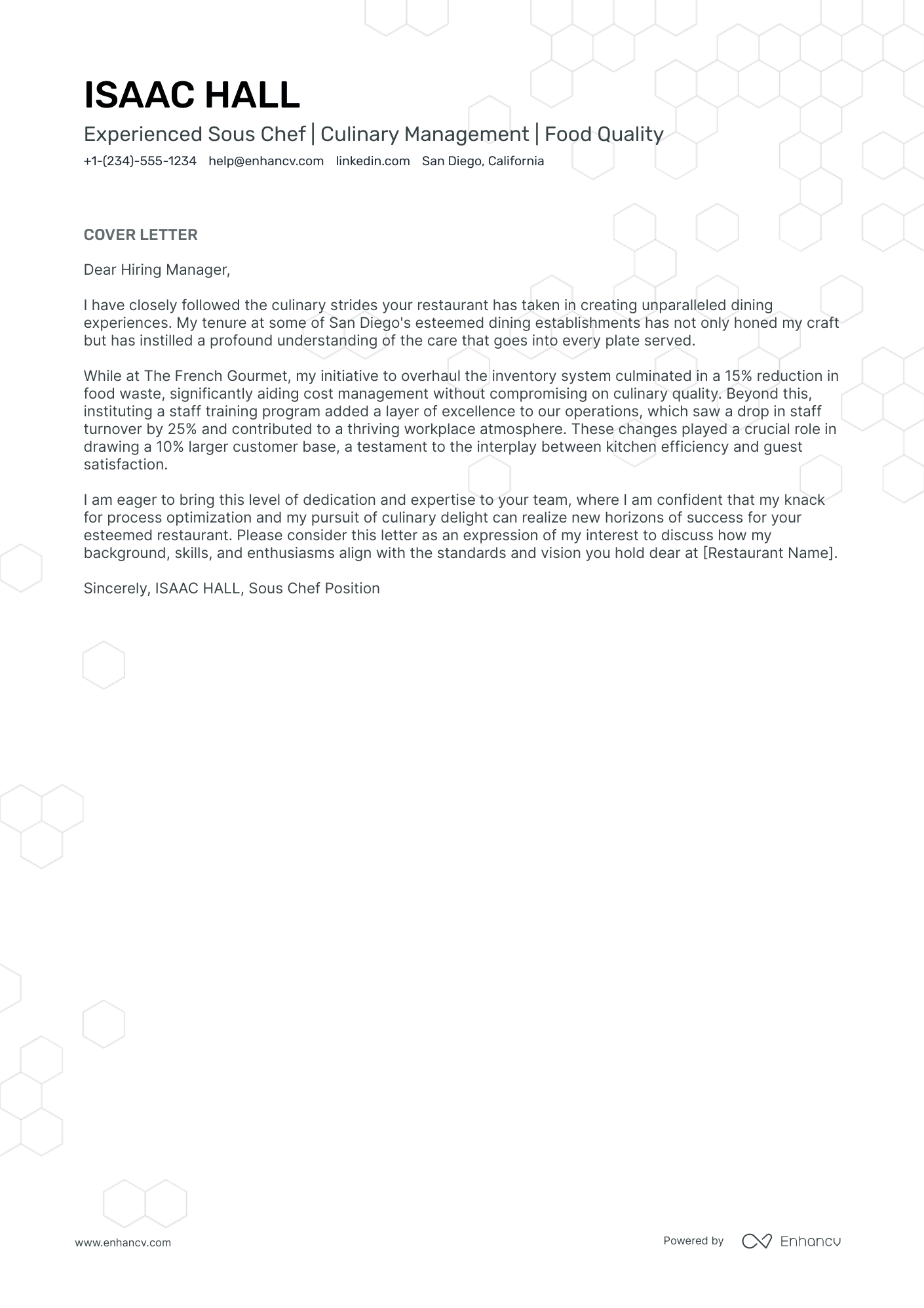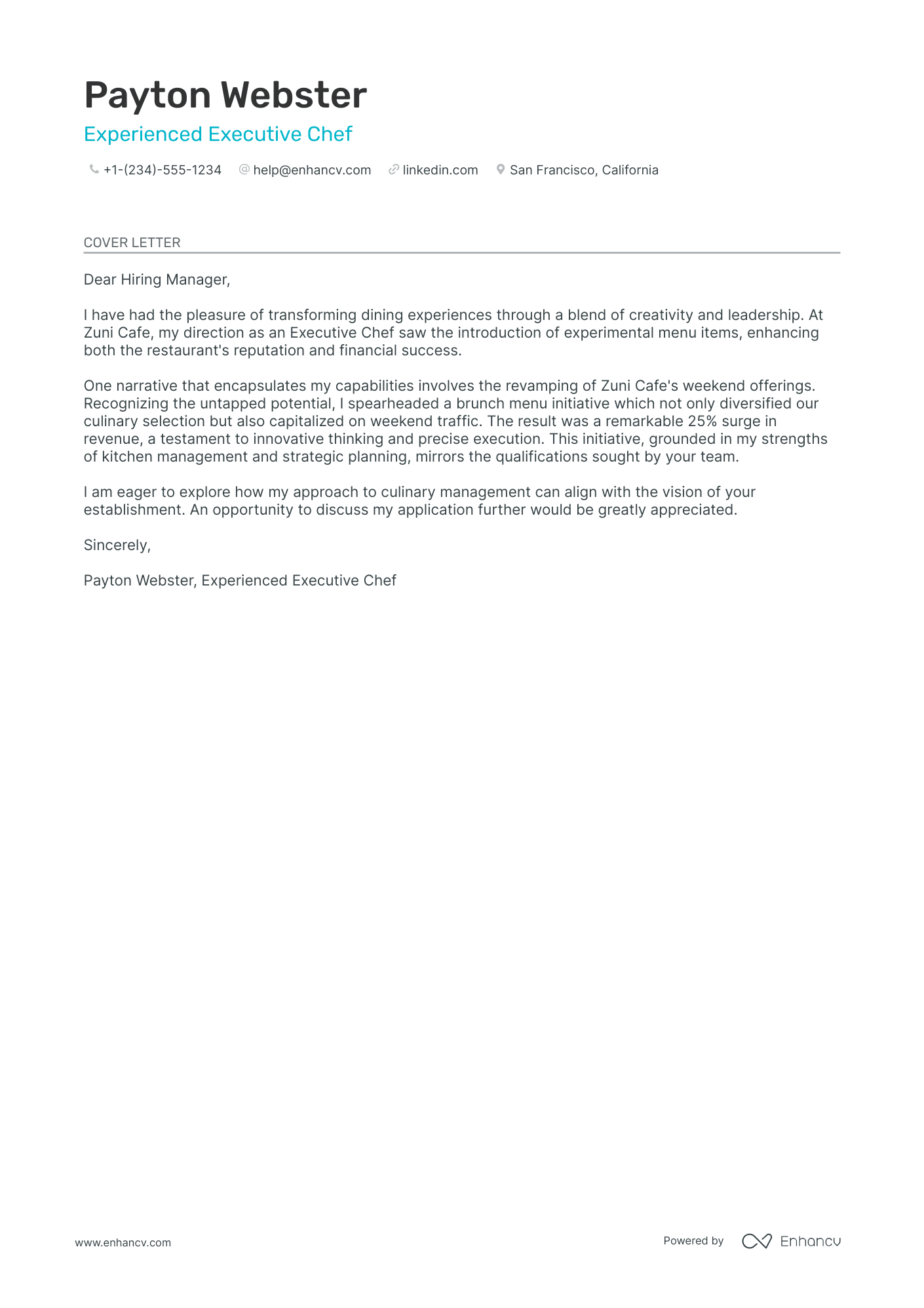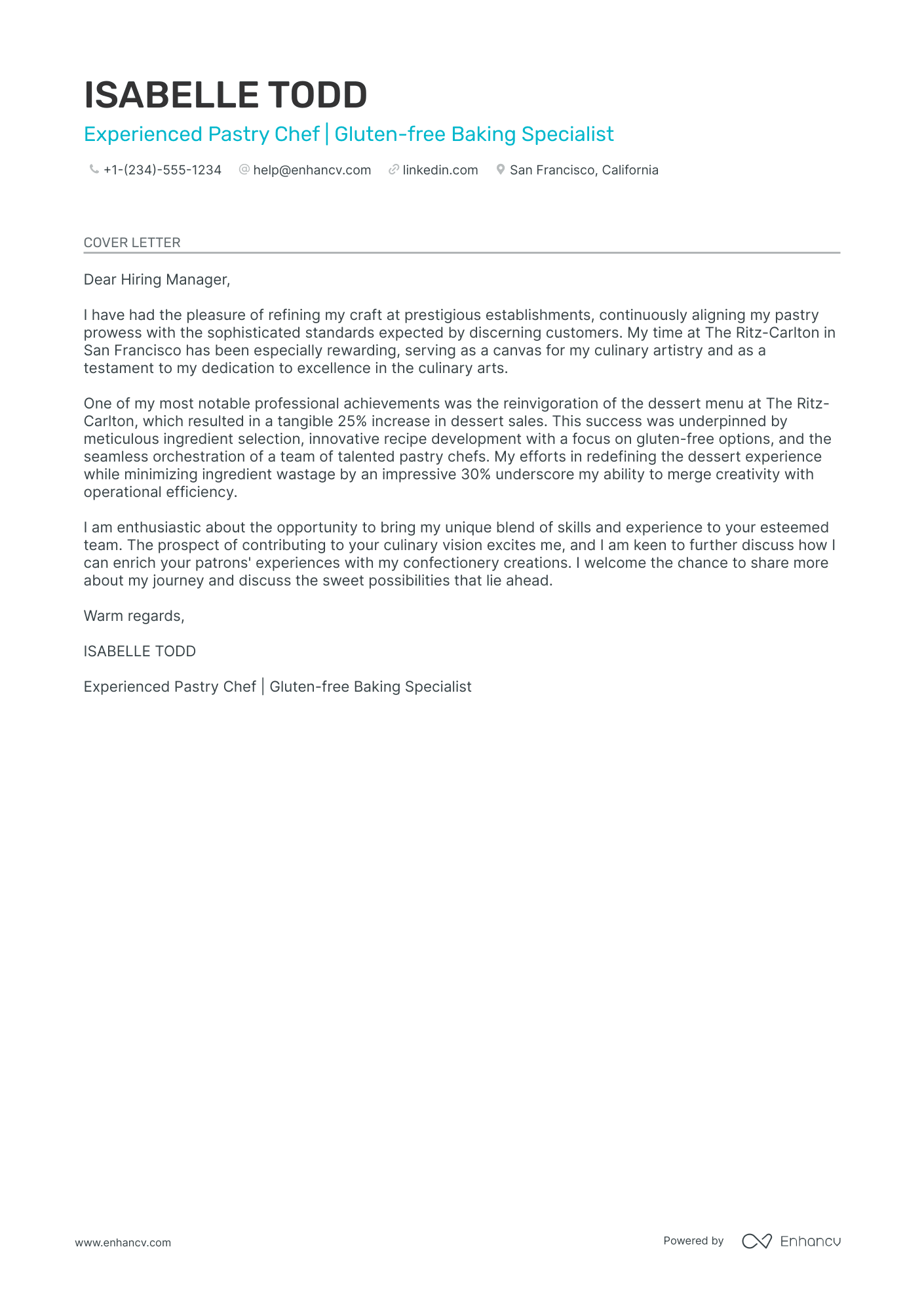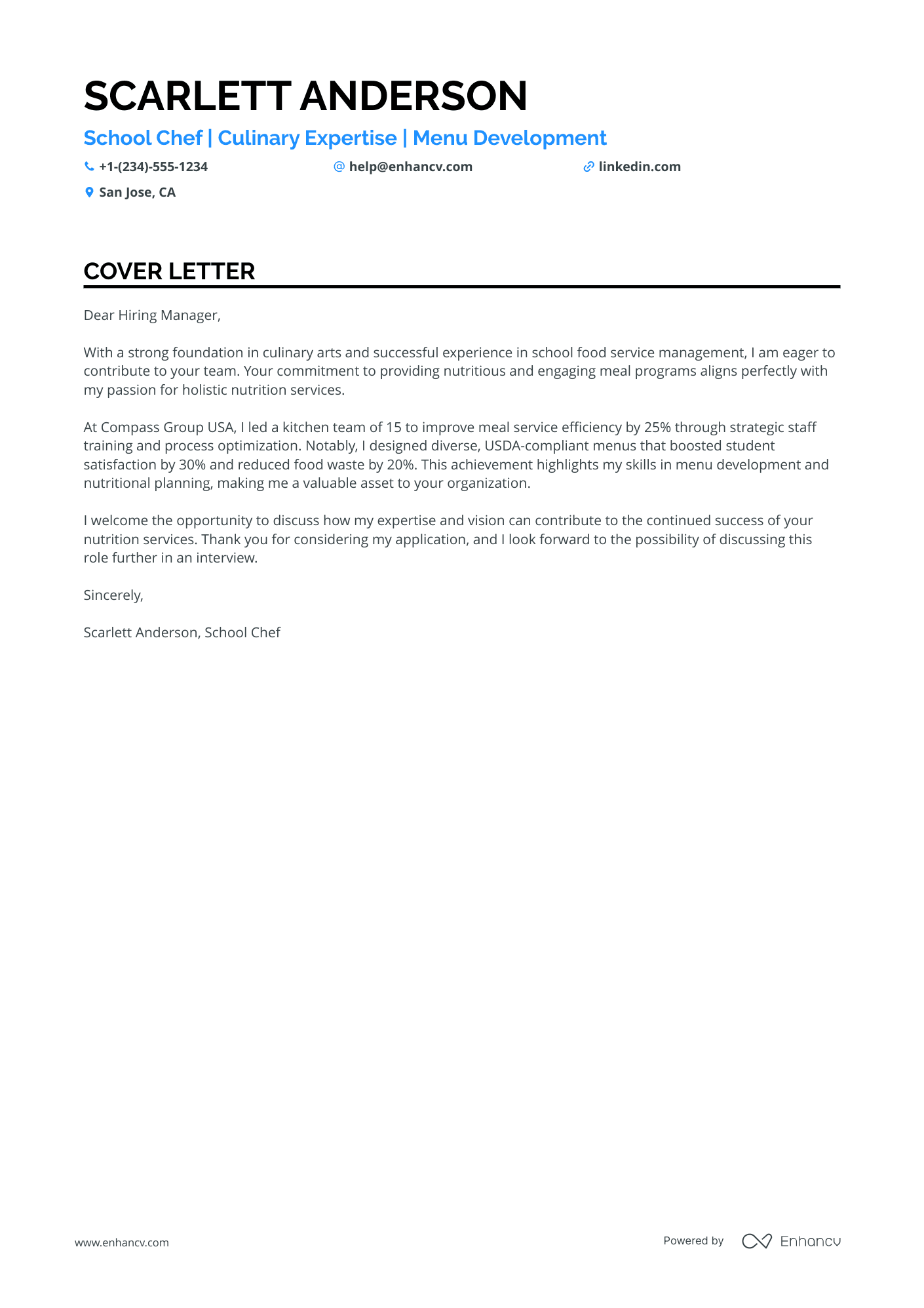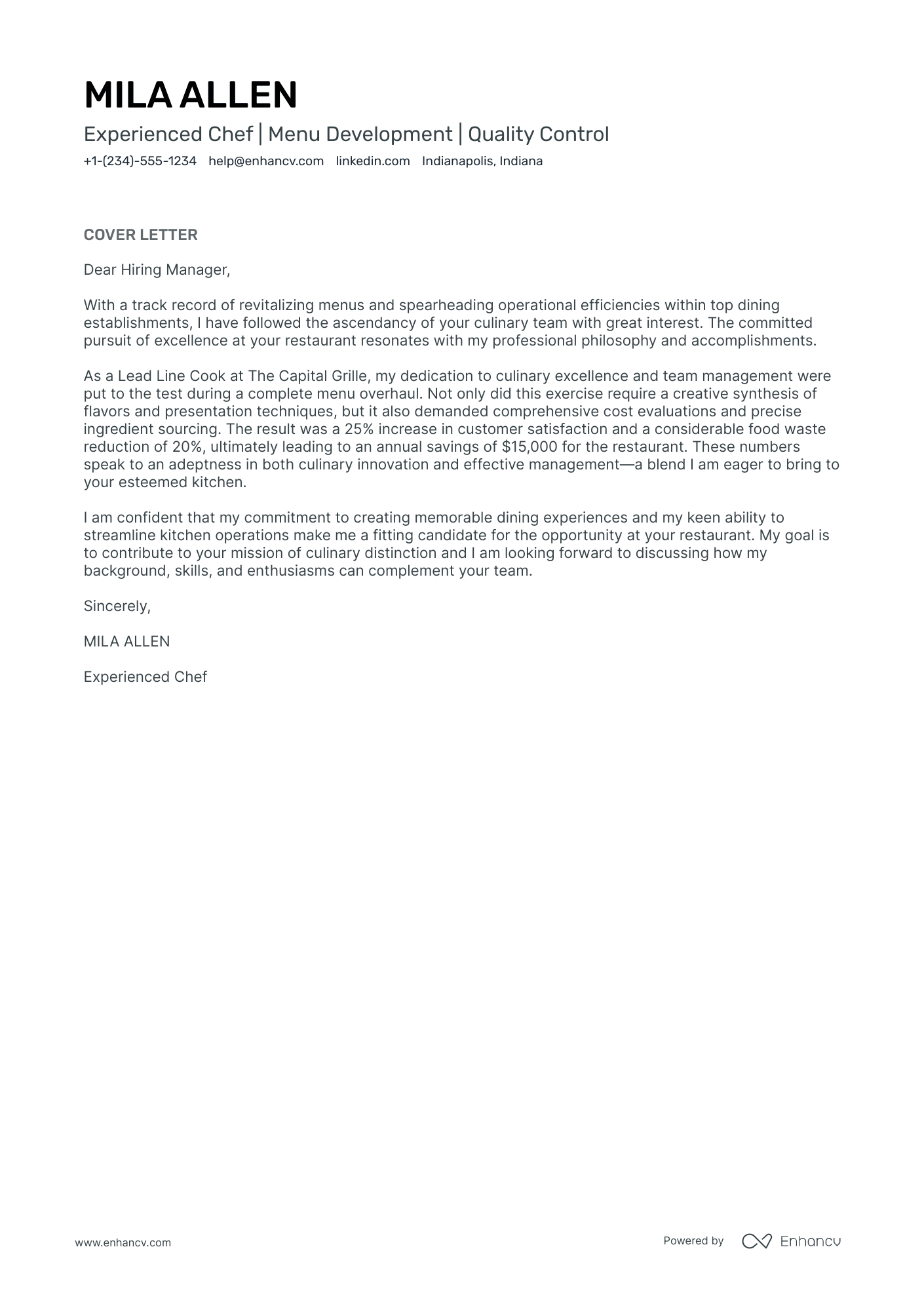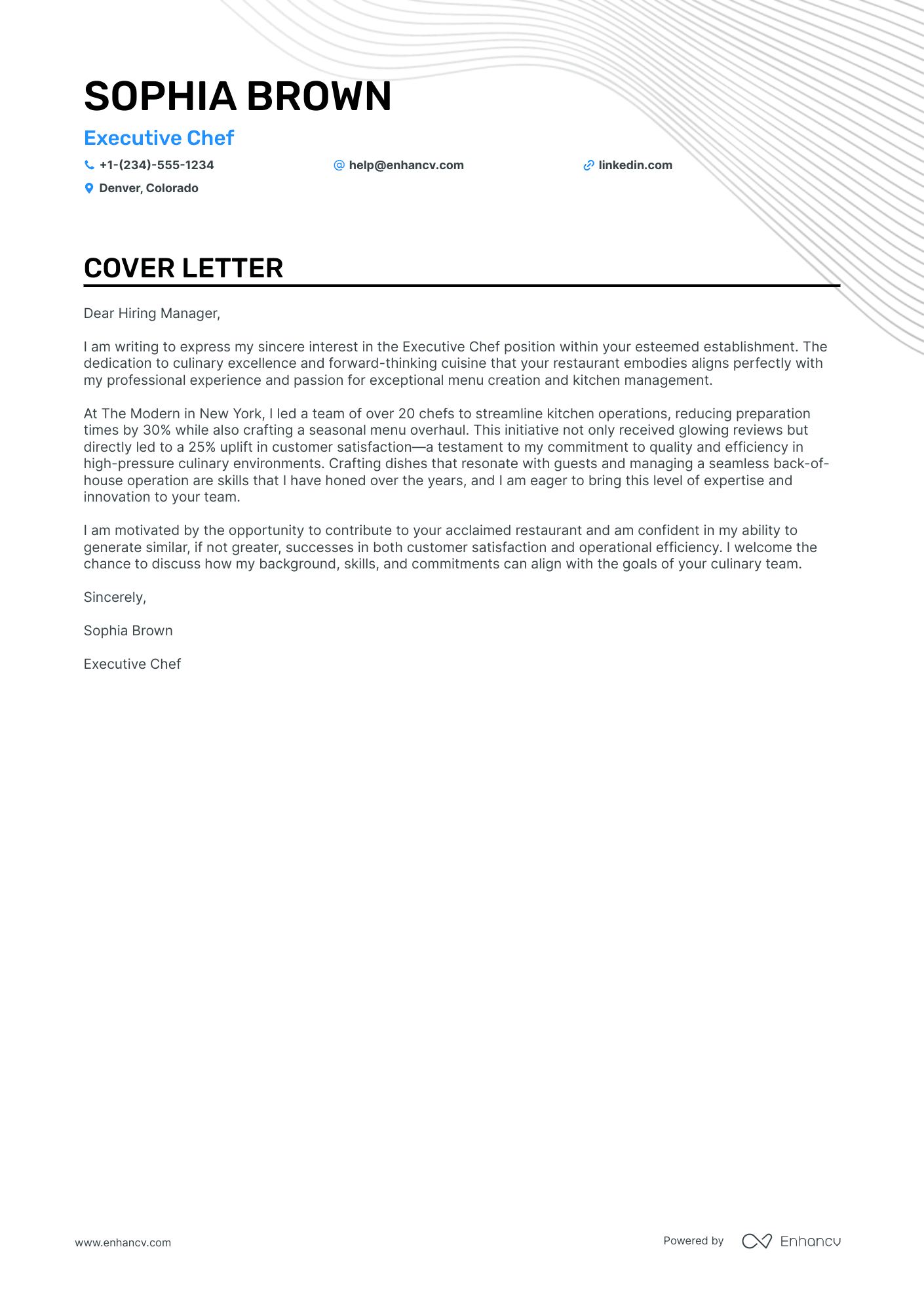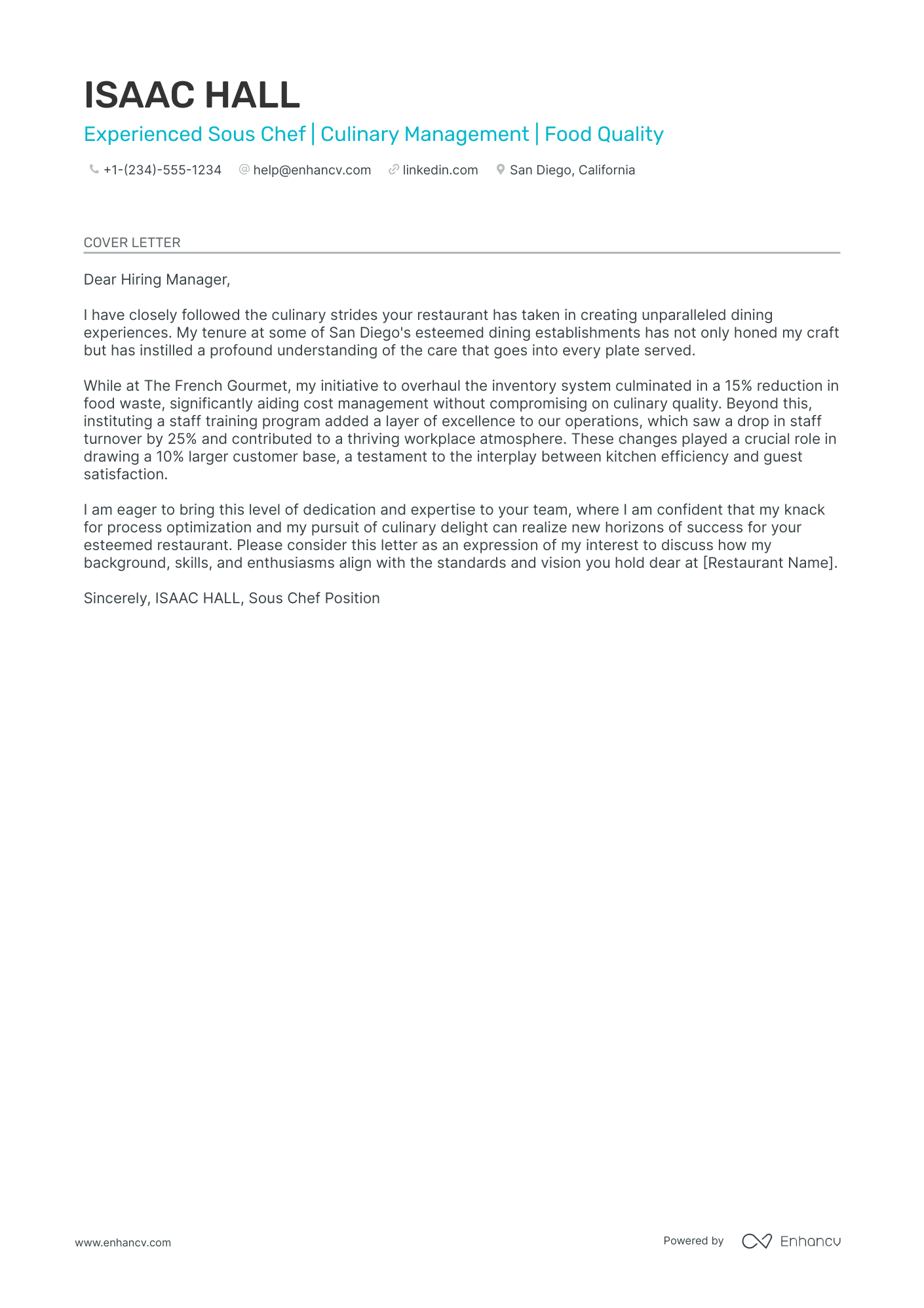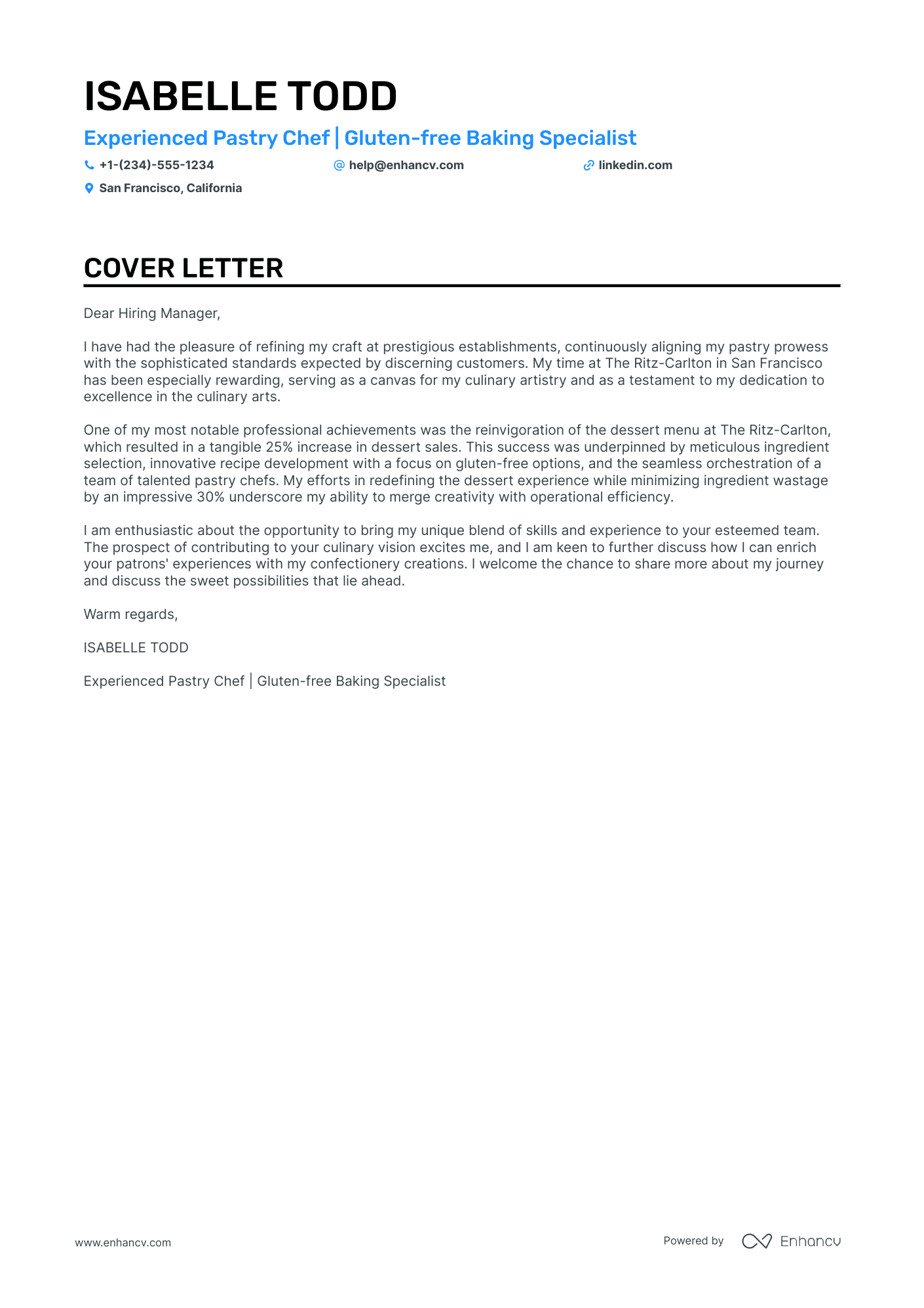Embarking on your culinary career journey, you’ve likely hit the stumbling block of writing a chef cover letter that garners attention. Clutching your resume, you realize that a compelling cover letter is your chance to flaunt that one proud professional milestone without echoing the resume verbatim. Crafting this blend of formality and personal flair, while ditching the worn-out clichés in a concise one-page narrative, can prove daunting—but fear not, as this guide will whisk you through the process with chef-like finesse.
- Introduce your profile to catch recruiters' attention;
- Use professional templates and examples to make sure your chef cover letter follows the best industry standards;
- Settle on your most story-worthy achievement to shine a light on what makes your application unique;
- Write a chef cover letter, even when you lack professional experience.
Ready to start with the basics: upload your resume to Enhancv's AI, below, to see the chef cover letter it would write for you.
If the chef isn't exactly the one you're looking for we have a plethora of cover letter examples for jobs like this one:
Drop your resume here or choose a file.
PDF & DOCX only. Max 2MB file size.
Chef cover letter example
Christian Torres
Denver, Colorado
+1-(234)-555-1234
help@enhancv.com
- Demonstrating alignment with the company's values - Mentioning a shared commitment to culinary innovation and sustainable practices shows that the applicant has done their research and is a good cultural fit for the restaurant.
- Quantifying achievements - The applicant provides specific percentages to showcase past successes, such as spearheading a 25% increase in diner satisfaction and reducing food costs by 15%, which gives measurable evidence of their skills and impact.
- Relevant experience - Discussing previous roles and achievements related to menu development and cost management directly corresponds to key responsibilities of an executive chef, showing that the applicant has the necessary background and expertise.
What about your chef cover letter format: organizing and structuring your information
Here is one secret you should know about your chef cover letter assessment. The Applicant Tracker System (or ATS) won't analyze your cover letter.
You should thus focus on making an excellent impression on recruiters by writing consistent:
- Header
- Greeting
- Introduction
- Body paragraphs (and explanation)
- Promise or Call to action
- Signature (that's optional)
Now, let's talk about the design of your chef cover letter.
Ensure all of your paragraphs are single-spaced and have a one-inch margins on all sides (like in our cover letter templates).
Also, our cover letter builder automatically takes care of the format and comes along with some of the most popular (and modern) fonts like Volkhov, Chivo, and Bitter.
Speaking of fonts, professionals advise you to keep your chef cover letter and resume in the same typography and avoid the over-used Arial or Times New Roman.
When wondering whether you should submit your chef cover letter in Doc or PDF, select the second, as PDF keeps all of your information and design consistent.
Need a cover letter, but short on time? Use our free cover letter generator to create one from your resume in no time.
The top sections on a chef cover letter
- Header: The header should include the chef's name, contact information, and the date, providing a professional appearance and making it easy for the recruiter to reach out for an interview.
- Greeting: The greeting should address the restaurant owner or head chef by name if possible, showing the applicant has done their research and is truly interested in the position at their specific establishment.
- Introduction: The introduction must grab the reader's attention by succinctly showcasing the chef's passion for cooking and their eagerness to contribute to the culinary team, setting the tone for the rest of the letter.
- Professional Experience and Skills: This section should highlight the chef's key achievements, special dishes or cuisines they are known for, and skills that would benefit the kitchen they're applying to, demonstrating their qualifications for the role.
- Closing: The closing should reiterate the chef's enthusiasm for the position, include a call to action inviting the recruiter to arrange an interview, and express gratitude for considering the application.
Key qualities recruiters search for in a candidate’s cover letter
- Culinary expertise and creativity: Recruiters seek chefs who can craft unique, flavorful dishes and contribute to the restaurant’s menu with innovative ideas.
- Experience with diverse cuisines: A chef's ability to cook a wide range of cuisines makes them a valuable asset to a kitchen team, showing adaptability and broad culinary knowledge.
- Leadership and team management skills: The ability to lead and manage a kitchen staff effectively ensures smooth operations and can improve the overall dining experience.
- Attention to detail and quality control: Chefs must maintain high standards for food preparation, presentation, and taste, overseeing every aspect of the kitchen to ensure consistency.
- Time management and efficiency: Working in a fast-paced environment requires chefs to be efficient, manage multiple tasks simultaneously, and maintain composure under pressure.
- Knowledge of health and safety regulations: A thorough understanding of sanitation and safety standards is critical for maintaining a safe kitchen and adhering to legal and regulatory requirements.
How to start your chef cover letter: with a greeting, of course
Have you ever considered just how powerful a personalized salutation can be?
We sure have news for you! Your chef cover letter should start with the right salutation to recruiters, nurturing a sense of respect and individuality.
Greet recruiters by using their first name (e.g. "Dear Tom" or "Dear Patricia") if you've previously established contact with them.
Otherwise, opt out for the less familiar, "Dear Ms. Peaches" or "Dear Ms Kelsey", if you've found the recruiter's name on LinkedIn or a corporate website.
"To whom it may concern" is never a good option, as it creates a sense that you've been sending out your chef cover letter to anyone. Instead, use "Dear HR team" or "Dear (company name) recruiter" for a feeling of exclusivity.
List of salutations you can use
- Dear Hiring Manager,
- Dear Chef [Last Name],
- Dear Mr./Ms. [Last Name],
- Dear Executive Chef,
- Dear [Restaurant Name] Team,
- Dear [Restaurant Name] Hiring Committee,
Your chef cover letter introduction and the value you bring
Moving on from the "Dear Recruiter" to your professional introduction.
Use those first two sentences of your chef cover letter to present the biggest asset you'd bring to the organization.
Don't go into too much detail about your achievement or the skill set, but instead - go straight for the win.
That is - what is your value as a professional?
Would you be able to build stronger, professional relationships in any type of communication? Or, potentially, integrate seamlessly into the team?
The middle or body of your chef cover letter body: a great instrument to tell a story
Now that you've set the right tone with the greeting and introduction of your chef cover letter, it's time to get down to business.
Hear us out, the body of your chef cover letter is the best storytelling instrument you have, in your job-hunting arsenal.
Writing the next three to six paragraphs, take the time to reassess the advert to discover job-crucial requirements.
Next, choose one accomplishment that covers those key skills and talents.
Use precisely that achievement to tell an exciting story of how you match the ideal candidate profile.
In the undertones of your story or chef cover letter body, hint at the difference you'd make and sell your application as the perfect one for the job.
Finishing off your chef cover letter with what matters most
So far, you've done a fantastic job in tailoring your chef cover letter for the role and recruiter.
Your final opportunity to make a good impression is your closing paragraph.
And, no, a "Sincerely yours" just won't do, as it sounds too vague and impersonal.
End your chef cover letter with the future in mind.
So, if you get this opportunity, what do you plan to achieve? Be as specific, as possible, of what value you'd bring to the organization.
You could also thank recruiters for their interest in your profile and prompt for follow-up actions (and organizing your first interview).
The zero experience chef cover letter: shifting the focus to your unique value
Don't worry if you have no conventional professional experience. Within your whole experience, there's plenty more you can write about in your chef cover letter.
Take, for example, your biggest achievement or award - dedicate your cover letter body to describe it and the job-relevant skills you've learned.
Your professional ambitions could also take center stage. Describe what you plan on achieving in the next five to ten years and the efforts you're making towards your dreams.
Key takeaways
Writing your chef cover letter has never been easier, so remember to:
- Select a chef cover letter template that automatically meets industry formatting (e.g. has one-inch margins, is single-spaced, is in PDF, etc.);
- Make your chef cover letter personal by mentioning the recruiters' first or last name;
- Within the introduction, describe what you like best about the company in no more than two sentences;
- Use your chef cover letter body to tell a story of your greatest achievement, backed up by job-relevant skills and technologies;
- If you have no professional experience, be honest about it in your chef cover letter, but also write about your unique talents.
Chef cover letter examples
By Experience
Entry Level Chef
By Role
Cook
Culinary
Sous Chef
Executive Chef
Pastry Chef
Private Chef
- Highlighting Leadership and Efficiency: The letter emphasizes the candidate's experience in leading a team and enhancing operational efficiency, which is crucial for managing school food service operations effectively.
- Menu Development and Nutritional Planning: It underscores the importance of designing diverse and compliant menus that improve student satisfaction while meeting nutritional standards, a key responsibility of a school chef.
- Alignment with Organizational Goals: The candidate aligns their experience and passion with the hiring organization's commitment to nutrition, showcasing both an understanding of the role and a shared vision.
